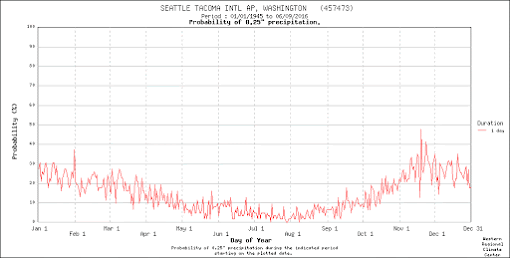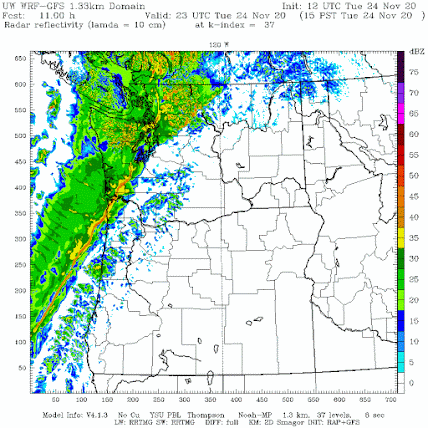During the past week, I have gotten a number of emails asking about the weather on Thanksgiving Day.
Why? Because a number of folks are planning on having their holiday meal outside in their garage, with the door open, to lessen the risk of COVID-19 transmission.
And it is true: a comprehensive search of the medical literature suggests little evidence of outdoor transmission. COVID-19 spread is predominantly a problem in indoor spaces with poor ventilation, particularly when large number of people stay in such spaces for a sustained period of time.
COVID-19 particle concentration levels are critical--lowering the concentrations can greatly reduce the risk and the severity of the disease if you get it. Outside, there is a huge amount of dispersion of particles, so concentration are inevitably low.
So enjoying your meal in a garage with open doors greatly lessens the risk of COVID-19, no doubt about it. And the latest forecasts suggest western Washington will have a dry Thanksgiving Day with no rain in the lowlands, light winds, and seasonal temperatures (upper 40s).
Wear a sweater and cap, and add a heat lamp or radiant heat, and it might be ok. Some warm cider or a hot toddy might make it better than that.
But for those folks who want to avoid moving to the garage, there is a powerful tool you can use to reduce the potential for COVID-19 transmission: filtration of the air with top of the line furnace filters or a high quality air purifier system.
I know a bit about this approach because of the recent wildfires and their resultant smoke. And the Centers for Disease Control (CDC) and the EPA acknowledge the value of air filtration for COVID as well.
The bottom line: a good furnace filter or air purifier system should be able to greatly reduce the numbers of COVID-19 aerosols in the air you breath indoors (if there are any, of course).
COVID-19 Particle Sizes
The COVID-19 virus is about .1 micron in size (a micron is a millionth of a meter). But the virus generally is enveloped in small aerosol droplet produced when we exhale or cough, ranging from .3-1 microns for the smallest to 3-10 microns for larger ones.
It turns out the high quality furnace filters can very effectively remove particles in these size ranges: filters that are known as MERV 13 or FPR 10 (or better).
This summer, one of my UW colleagues and hiking buddy, Professor Dan Jaffe, tested the ability of a furnace filter to clean the air in a single room. He created a very inexpensive filtration system, taping a MERV 13 furnace filter to a box fan (total cost about $40).
There were a lot of particles in the air from the regional fires, so this was serious test! Below are the results showing the how the concentrations of particles of .3 and 2.5 microns changed in time. Just amazing... most the particles were taken out in 15 minutes. It would do the same for COVID-19 aerosols. A number of other groups have done similar tests with the same results.
Some of you might have constructed such a box fan filter during the wildfire smoke period, while others may have purchased a commercial air purifier. If you have forced air heat in your home or apartment, make sure that it has a MERV 13/FPR 10 filter in place, and set the fan to run continuously.
This was proven to work very well for wildfire smoke (whose size is similar to small COVID-19 droplets)
Image courtesy of Dan Jaffe
If you have a fireplace in your home or apartment, use it, and open up a window. The fireplace will suck in lots of outside air and warm you up to compensate. More outside air will help reduce COVID-19 aerosol concentration.
This kind of air filtration will not necessarily eliminate any COVID risk, but is one approach to lessening airborne transmission. Enjoy your holiday meal.
Addendum:
The Wall Street Journal has put out a excellent video on ventilation and filtration for COVID-19:
https://www.wsj.com/video/ventilation-is-key-to-battling-covid-heres-why/EC6274D1-B4F0-40DF-A8EC-F9BDA7C5D1A1.html?mod=trending_now_video_pos1
________________________________________
My latest podcast on Thanksgiving week weather and major NW storms:
Click the play button to listen or use your favorite streaming service
Or stream my podcast from your favorite services:
Would you like to support the podcast?
If so, click the Patreon box below.








































